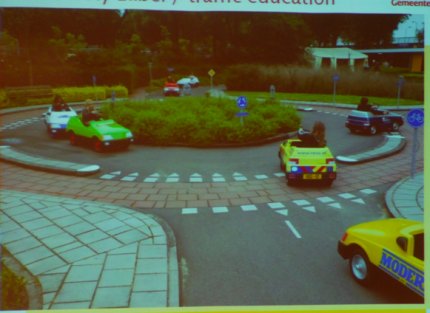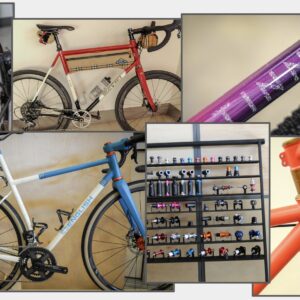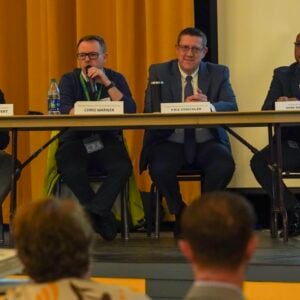Portland will be in the spotlight next week when the nation’s leading experts on bicycling and walking planners descend on our city for the Association of Pedestrian and Bicycle Professionals annual conference.
Launched in Portland 25 years ago, the APBP offers expertise, information, and inspiration for their 1,200 members. Their annual conference will feature over 200 speakers (including 17 Portland Bureau of Transportation staffers) over three days of keynotes, mobile tours, panels, and more. It kicks off Sunday August 25th with biking and walking tours during the “Green Loop” edition of Sunday Parkways.
The meat of the five-day agenda is Monday through Wednesday when attendees will attend sessions on everything from racial equity and the psychology of cycling, to signal timing and the future of micromobility.
Here are the sessions that caught my eye:
European Inspired Emerging Best Practices in Bicycle Facility Design
This panel presentation will begin with the overarching framework regarding adapting European bicycle facility designs to North America. It will discuss how US history and the resulting built environment context sets us up for challenges and how some North American cities are having success overcoming those challenges. It will then delve into the emerging best practices in bicycle facility design from Europe. This includes protected intersections, the next generation of bicycle facilities from The Netherlands, traffic calming European rural roads, and new applications of advisory bike lanes.
Moderator: Kristin Bennett
Panelists: Brian Patterson, Lennart Nout, Tom Bertulis, Michael Williams, Jessica Zdeb
The Multimodal Suburb: Transforming Communities Through Planning, Policy, Advocacy
The typical suburban community is designed around cars and is neither safe nor welcoming for people wishing to walk, bike or ride transit. Solutions to make our suburbs more walkable, healthy, and equitable are long overdue. This session dives into projects currently underway to transform suburban mobility in Chicago, Portland, and Toronto. Panelists will discuss and share lessons from specific projects in suburban communities, including mobilizing residents as changemakers, implementing policies and plans that help biking, walking, and transit initiatives thrive, and introducing new mobility options – like dockless e-bikeshare and e-scootershare.
Panelists: Maggie Melin, Matt Pinder, Ray Atkinson
Process, Partnership, and Public Engagement: Using Fast and Flexible Strategies to Deliver More Complete Streets
Tactical urbanist, demonstration, quick build, and repaving projects demonstrate how street space can be transformed with a low budget and quick turnaround to slow cars and protect vulnerable road users. These projects illustrate the roles that public agencies, advocates, community groups, and private organizations have in planning and building Complete Streets. This session focuses on the project design and delivery process, and lessons learned in navigating the complex and sometimes problematic agency-advocacy-public relationships that are fundamental to this work. Using specific project examples, speakers will highlight the importance of advocacy and partnerships and the need for continuous, equitable public engagement.
Panelist: Dani Hess, Nicholas Oyler, Eric Anderson, Brytanee Brown
Advertisement
Panel: Your Brain on a Bike: Psychology-Informed Approaches to Active Transportation
Transportation decisions get made by humans, but bicycling experts have spent far too little time using psychology to understand the complex way these decisions get made. Join this panel to hear from three efforts that put psychology and evidence front and center:- Arthur Orsini (Vancouver Coastal Health) will discuss how he has applied the Stages of Change behavior change theory to creating employee walking and bicycling commute programs that really work.- Seth LaJeunesse (Highway Safety Research Center at University of North Carolina) will discuss the potential for applying diffusion theory to building support for Vision Zero policies.- Jessica Roberts (Alta Planning + Design) will discuss in-progress behavioral science research she is leading and advising to create more effective transportation mode shift programs.
Keynote: Centering the Black Experience in Active Transportation
#BlackLivesMatter, right? And yet, understanding and addressing the experiences of Black people in our transportation systems remains a marginal part of the work to increase walking and bicycling in our communities. What would it mean to center active transportation planning, design and programs around the needs of the Black community? What do we need to shift and why is that shift important? Where do we start? Join us for a dynamic stage discussion with Rukaiyah Adams of the Albina Vision Trust and Charlene McGee Kollie, who leads the Racial and Ethnic Approaches to Community Health (REACH) Program at the Multnomah County Health Department. This dialogue will be facilitated by Irene Marion, Equity and Inclusion Manager of the Portland Bureau of Transportation (PBOT), where she has led efforts to center Black voices in transportation planning and program partnerships.
Moderator: Irene Marion
Panelists: Rukaiyah Adams, Charlene McGee Kollie
Panel: Bike Network Evaluation: Low Stress Bike Accessibility & Connectivity
Being able to identify and evaluate a low-stress bike network is critical for planning and prioritization. Three leaders in the field will describe the data and process used to identify a city’s low-traffic-stress bike network, along with methods use to evaluate it in terms of connectivity and access to jobs, shops, schools, and other important destinations. Examples using the People for Bikes’ Bike Network Analysis tool, the Rails to Trails Conservancy’s BikeAble tool, and the latest advances in Level of Travel Stress (LTS) methodology will address data challenges, informative map views, and new perspectives on dealing with one-way streets.
Panelists: Peter Furth, Spencer Gardner, Michael Lowry
Panel: Agency Safety and Liability for Pedestrian and Bike Improvements
The presentation will focus on how agencies can pursue innovative improvements for pedestrians and bicycles while minimizing liability and risk. Pedestrian and bicycle collisions are generally rare events, but when they occur it is common for public agencies to be named in lawsuits. This presesntation will discuss how liability varies for each US State, and how Vision Zero programs are viewed. It will describe processes that can improve the agencies position in a lawsuit.
Moderator: Peter Koonce
Panelists: Rock Miller, Ashley Carter, Scott Kocher, Dr. David Hurwitz
Panel: Going Macro with Micromobility
This panel will explore the evolving landscape of micromobility and its integration into cities. Panelists from large and mid-size cities will discuss their experiences and approaches in working with private micromobility providers and adapting programs and facilities to new users and rules of the road. Micromobility providers will shed light on the factors involved in success and profitability, and their experiences as private companies operating in the public realm. Moderated discussions and audience questions will go deeper into the dynamics between public and private entities in the transportation realm, and challenge us to envision the streetscape of the future (including winners and losers in the race for mode share).
Moderators: Melissa May White, AICP, Rae-Leigh Stark
Panelists: Briana Orr, Brandon Blankenagel, Andy Boenau, Anne Brask, Kay Cheng, William Henderson, Alexander Kado, Joel Miller, Jamie Parks, Gabriel Scheer
I plan to attend some of the sessions and report back what I learn/see/hear. If you’d like to attend, registration is $885 for non-members and $700-$775 for members. Students who aren’t APBP members can get in for $205. Single-day registration for non-members is $400.
Learn more at the official conference website.
— Jonathan Maus: (503) 706-8804, @jonathan_maus on Twitter and jonathan@bikeportland.org
Never miss a story. Sign-up for the daily BP Headlines email.
BikePortland needs your support.






I regularly tune in to APBP webinars. I must say that what I usually find are presenters who have never been exposed to scientific thought processes. (Quick definition: disproving models and creating new testable models from the wreckage.)
The result is that the best information I get from these things are at best trivial, like fire chiefs moving to smaller engines so that cities can overcome one of the excuses for improving streets. These things often feel like cheer leading camps where victory is always near, but never achieved. You’ll hear about “best practices” that have thus far failed to succeed in an American context. That’s not “best”, that’s just another way of failing.
I stopped going to OATS for this reason. Not enough new content worth my vacation day year after year.
Wow. 17 PBOT staffers are participating as speakers.
I wonder if any of them will be speaking about the ever-increasing implementation of stuff in Portland that doesn’t work well for cyclists.
When you go to the website, under location there is a link to driving directions — no information about alternative modes. Amazing how even a conference for alternative transportation planning plans it’s conference around the car.
If you actually looked at the conference site you’d see multimodal options here – https://www.cvent.com/events/2019-apbp-conference/custom-18-5ddc6e7c032e40339521f4857e8bc4b4.aspx?dvce=1
Does every conference on everything now have to have 20% of itself be about “equity”?
(asking for a privileged friend)
TBH every session at every conference should include ‘equity’ rather than just being a separate 20% that people can avoid. As long as there are inequities, how can we tout programs/policies/best practices unless they explicitly address benefits/access/burdens?
Feel-good get togethers like this go nowhere. Unfortunately, America has reached a point where it’s unable to solve its problems. They just go on and on…
When I looked at the agenda I actually was really troubled by the first session you highlighted (the European model). One of the HUGE takeaways I got from “Bicycle: Race” is that we continue to design, in this country, based on the experience of the European white person. And this perspective dimisses and discounts the perspective on the non-white USA born-and-raised person. It’s not enough to have a separate keynote on Centering the Black Experience — that MUST be part of the conversation when evaluating if the European model will work for many people in the US.
Note, I LOVE the European model and the northern Europe cities I’ve visited. I see great value in picking up Copenhagen and just putting in everything they have here. But does that serve people with very different perspectives about their safety outside of a car? I don’t know, but we just shouldn’t continue to assume if we build it they will come. It’s like designing a bikeway that routes ppl up onto a sidewalk — works for those on a standard bike but fails immediately if on a longtail or pulling a trailer or have huge saddle bags, etc.
This is peak bike portland commentary, and I wouldn’t change it at all.
Useless. We are running out of time. Unless Portland pushes EV adoption as hard as Norway, or comes close to the transportation efforts of Amsterdam we are losing. It’s not hard, just takes one leader to stand up and say “this is what we are doing”.
And yes, equity matters, but also doesn’t. Know what I mean? Perfect is the enemy of good.